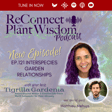
Ep.80 Generations of Programming
In this episode, I share a candid conversation sparked by a simple interaction with a friend. We explore the concept of generational programming, how it shapes our behaviors and interactions, and the importance of questioning these inherited norms to live more authentically.
I talk openly about the crucial role of doubt in challenging cultural and societal programming. Drawing parallels from the plant kingdom, we learn how plants adapt to their environments, offering valuable lessons on flexibility and resilience. By recognizing the values and goals behind our conditioned behaviors, we can make conscious choices that better serve our current reality and growth.
Tune in as I unravel layers of conditioning and provide practical insights on embracing change and cultivating a life of flow. This episode is a call to action to examine your inherited beliefs, honor their origins, and adapt them to support your true self in today's world. Let's learn from the plant kingdom and take steps towards a more authentic and fulfilling life.
Topics Covered about generational programming
➡️ How deeply ingrained cultural and societal norms shape behaviors and interactions, often hindering growth and authentic living.
➡️ Importance of questioning inherited beliefs and introducing doubt as a positive tool for personal development.
➡️ Drawing parallels from plant adaptation strategies to illustrate how flexibility and resilience can be cultivated in human lives.
Resources Mentioned
🌱 Live Plant Consciousness Commentary
🌱 Identify the Right Mentorship Program for You
🌱 1:1 Coaching and Mentorship
🌟Connect with nature-conscious creatives, multipotentialites, and naturentrepreneursin the premier online ecosystem that nourishes plant reawakening and community support for accelerated evolution and co-creation with otherkin. >> JOIN OUR COMMUNITY <<
☝🏽ReConnect with Plant Wisdom podcast Ancient and modern knowledge from biology to spirituality about the wondrous ways plants help you lead a Naturally Conscious life. Subscribe on your favorite podcast player.
// Let's work together: book a Discovery Call
// EcoConscious Business Partners:
Get 30% off podcasting with Zencastr (coupon code nccsprout)
Shop Here
// Opening and Closing music by Steve Sciulli and Poinsettia from The Singing Life of Plants
// Socialize with me Facebook | Instagram | LinkedIn | Youtube



















